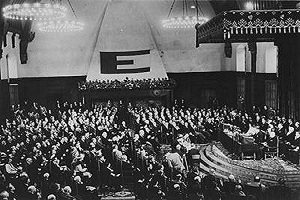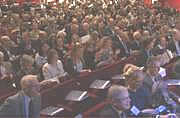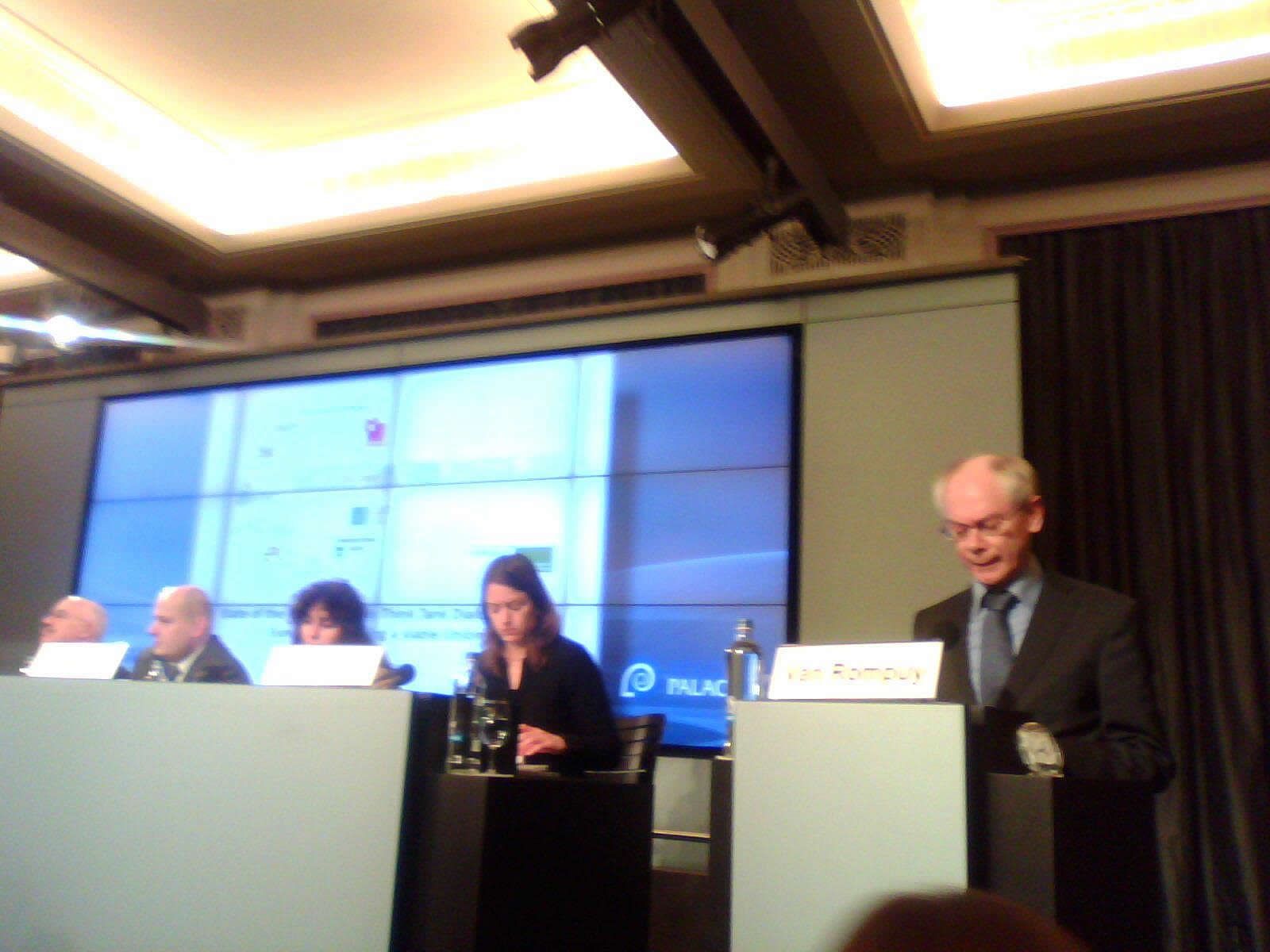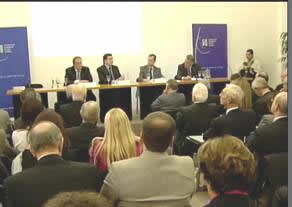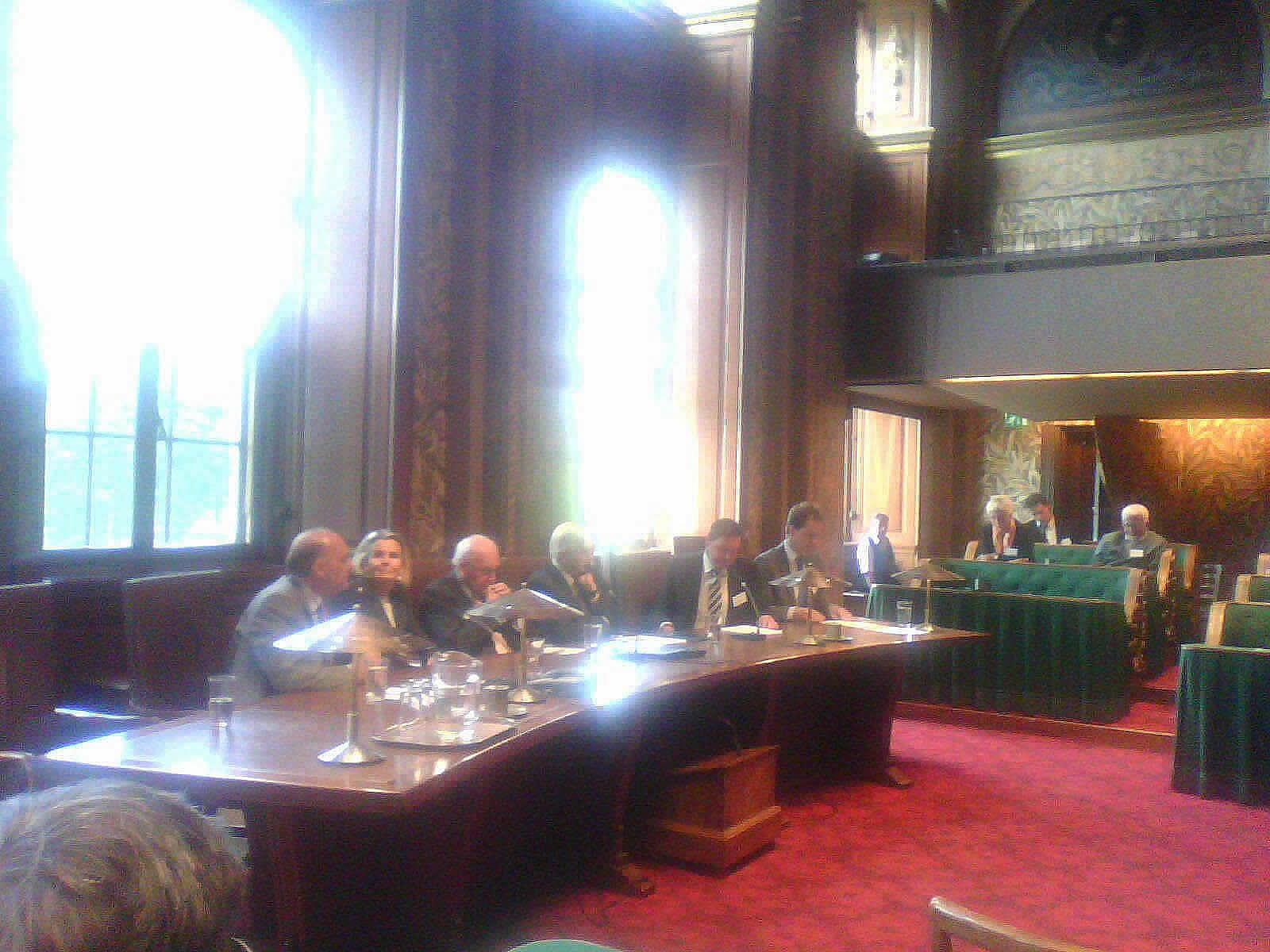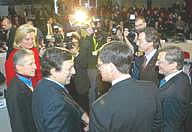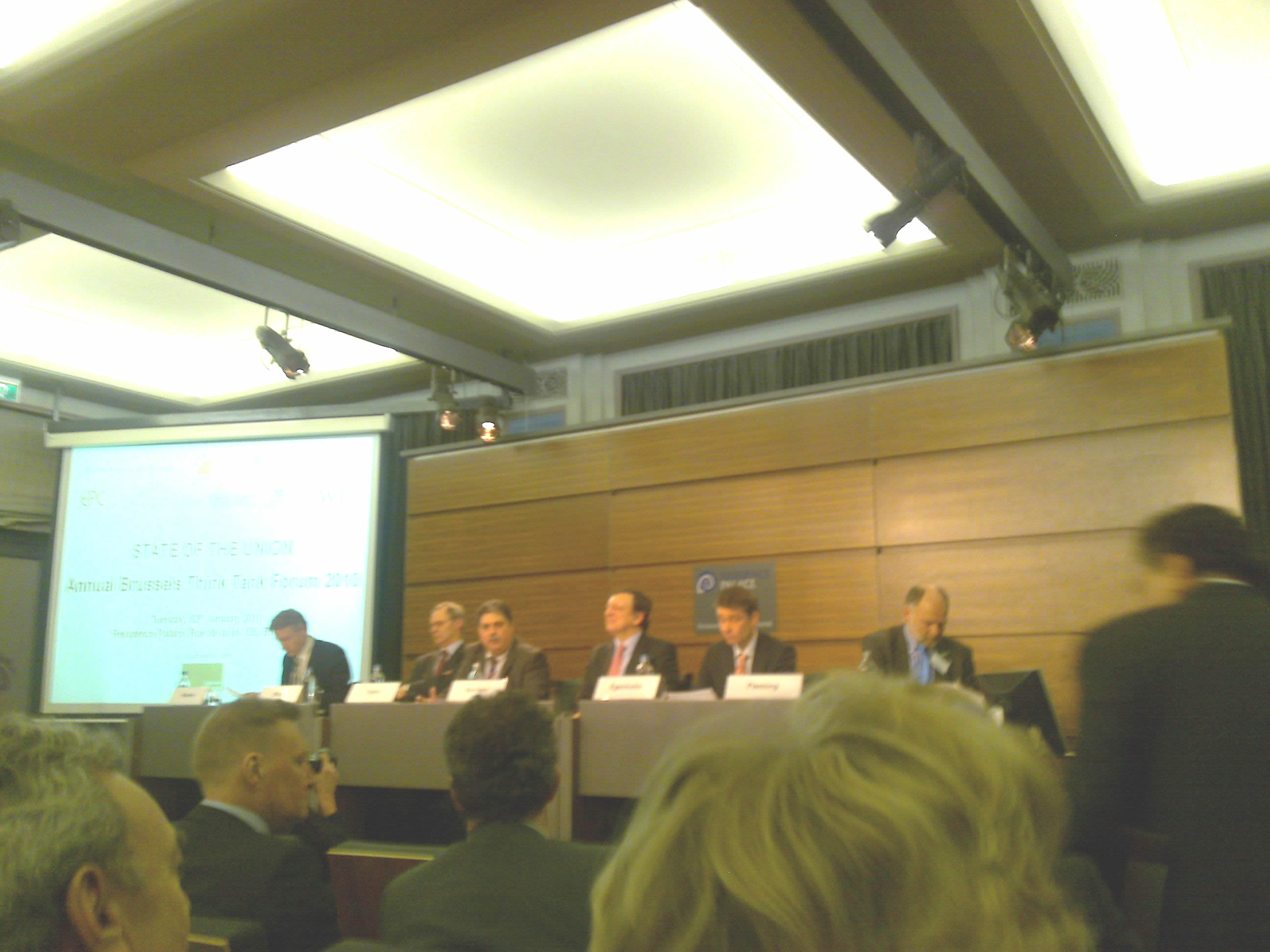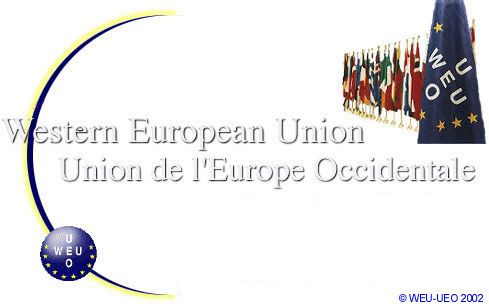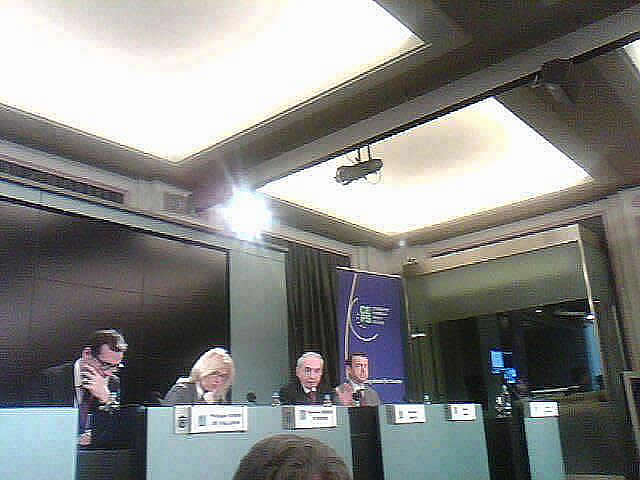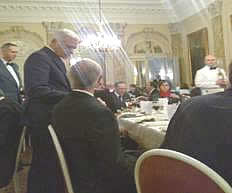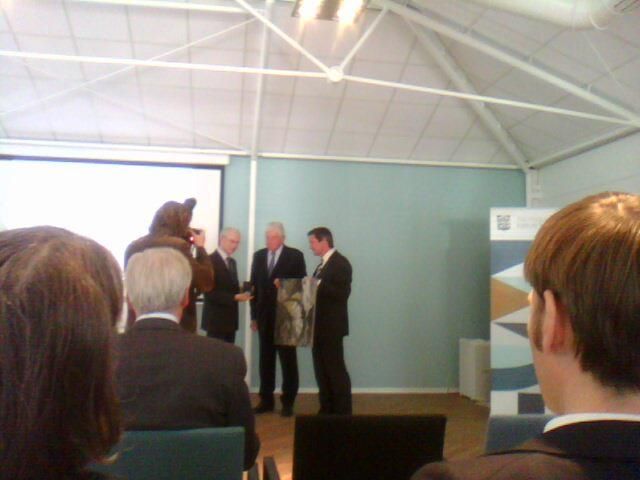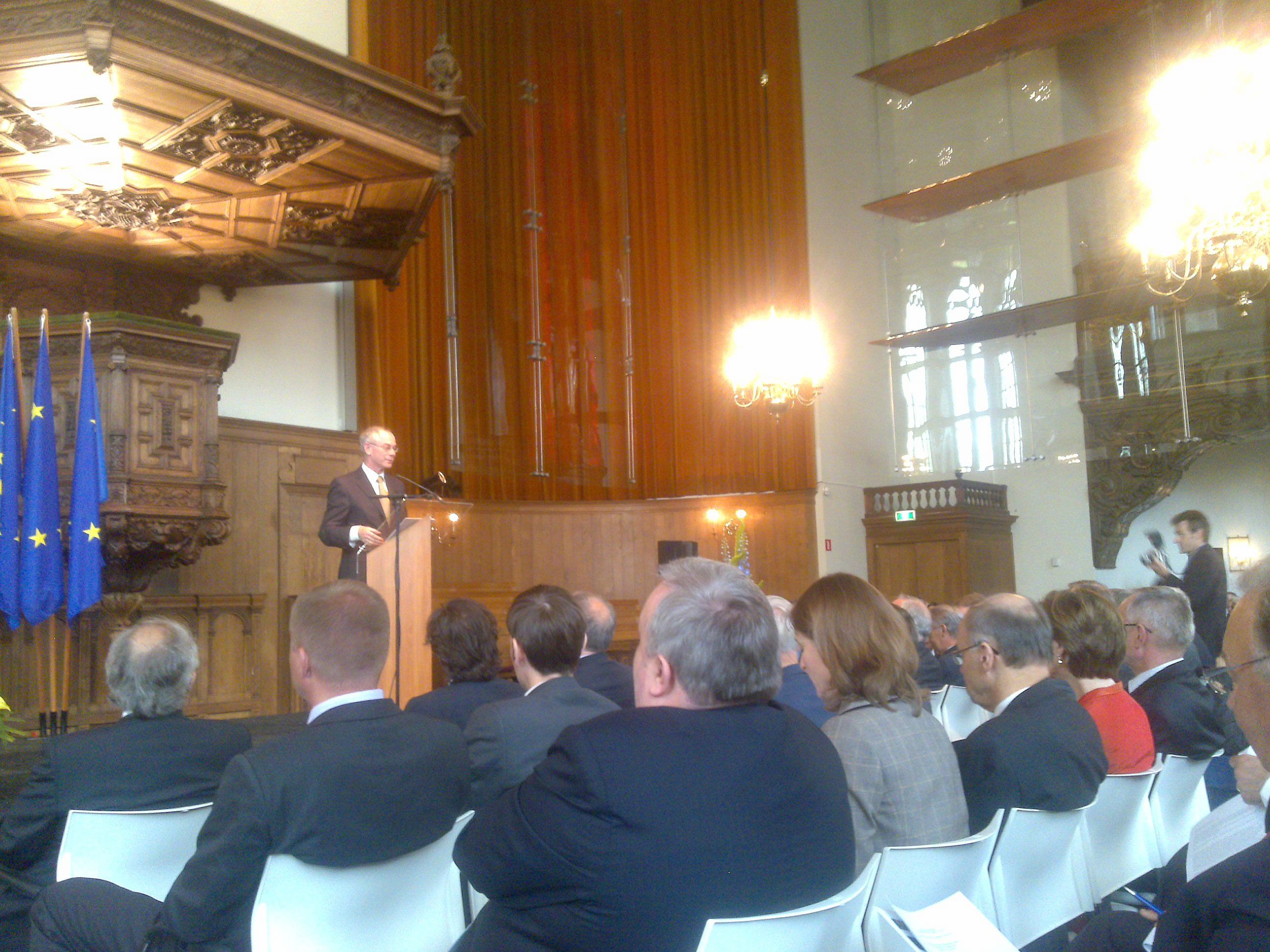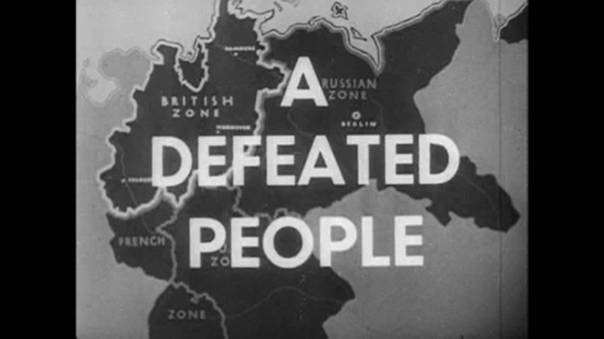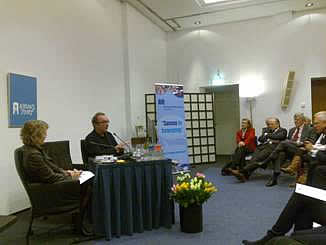14 November 1999, Jacques Delors addressed at the Aspen Institute the Wallenberg lecture, called "Reuniting Europe: Our Historic Mission":
With the collapse of the Soviet empire, history is once again on the march in Europe. But although the fall of the Berlin Wall truly paved the way for the reunification of Europe, the ten
years which have since elapsed have been merely what might be termed a "transitional" stage towards the market economy and democracy. For many of the European countries in question the future is still uncertain. During this lecture not only the cultural dimension, the geopolitical dimension, and the political project was raised, but also the need for the presence of viable institutions.
Our life and physical, mental and virtual environment can become more comfortable. Speaking about date and place, there will also be a change of notion.
Europe is still a powerful bloc and on term she can become stronger by taking up a position as a hub, her smartness, her enlargement-policy, by shared objectives with the US and by trade and stability agreements.
SMO (The Institute for Society and Enterprise - The Hague) shows us thoughts on not only wireless utility computing, hybrid cars, nanotechnology (self-cleaning windows, coats that become a raincoat at the moment it starts to rain and.probes by which it become possible to save millions of gigabytes on one harddisk), but also on smart robots, alternative energy and quantum computing.
Today the European Union (EU) has not only
become a single integrated market and trading
block of 500 million people, though that in
itself would have been a considerable achievement. For its 28 member countries, it is also a major legislative force: its
regulations and policies reach into many areas
of economic and social life. In order to prevent total global collapse and disruption, it is of importance to work on fair trade, tax harmonization, financial stability,
on eco-social thinking and acting, together with a humanistic attitude to life and thinking ahead on outlooks: economics and innovation are needed drivers.
New findings and inventions will give impulse.
These aspects take care of turning-points and will create a new era and new markets.
But think global - act European: The challenge is not only about finding the right compromises to put the new institutional
apparatus into place but to take its full potential for increasing urgently the efficiency of policy-making at EU level and timely allowing the EU to take fundamental decisions in a worrying international context.During a conference 'Why Europe?' in 2006 SIEPS devoted attention to possibilities and limits of European integration. In 'Great Decisions 2008'
Andrew Moravcsik wrote about European integration: 'A half century ago, who would have believed
that Europe—and, at its heart, hereditary
enemies France and Germany—would sponsor
the single most successful voluntary international
institution in human history?
In two
generations, European integration has not only
contributed to economic growth and political
stability,
but it has fundamentally altered the way
Europeans think about national sovereignty and
national identity.
European political cooperation does not develop sustainably. Periods of standing still, relapse or progress does constantly alternate. In February 2006, European Security Forum together with CEPS and IISS issued the paper 'STRATEGIC IMPLICATIONS OF THE EU CRISIS', primarily as a result of the French and Dutch rejections of the Constitutional Treaty, which have opened up a period of deep
and protracted difficulties for the European Union. The strategic implications of the new
situation are compounded by the fact that foreign and security policy was one of the areas in
which significant innovations have been provided for by the treaty.
Chairman's summing-up:
In presenting a paper on the American perspective, disputed was the notion of a ‘crisis’ in
the literal sense of the word, preferring the word ‘malaise’. Underscored was the limited extent of ‘Schadenfreude’ in Washington. There was now a good chance to move away, on
both sides of the Atlantic, from moralising attitudes, to have a more dynamic debate on the future of
Europe. The director of the Aspen Institute Berlin noted that the strategic glue between the US and
Europe was not as readily provided as before by common values (but not ‘clone’ values) or common
interests (we all have ‘sharper elbows’ and our interests don’t always coincide). But when addressing
the question of transatlantic co-operation, his view was that it was necessary to think through the alternatives to sticking together.
|
The Institute of Europe of the Russian Academy of Sciences (IE RAS), put forward the proposition
that the EU crisis means the end of a ‘normative empire’. While emphasising the absence of mutual
trust in the EU-Russia relationship, it was considered that the future of the European integration project
cannot be abstracted from the form of co-operation with Russia, in effect a European-Russian future. The aim was to extend ‘peace in Eurasia’ in the same way that the EU’s goal had hitherto
been ‘peace in Europe’. Underlined was also the importance of interests in providing the glue between the US and the EU
as between Russia and the EU.
Defended were the virtues of ambiguity
within the context of existing treaty language (which mentions ‘Europe’ without defining it in
geographical terms). Be wary of using the word ‘crisis’, which conveys the
impression that European integration is essentially treaty-driven whereas recent examples (the
Services Directive, the European Arrest Warrant) show otherwise. Considered was that in the case of
CFSP, political will is more important than institutions. In presenting the proposals
concerning variable geometry, recalled was the need to define those areas which would need to be
common and not variable (e.g. trade, competitions, single market, fisheries, regional policy, elements
of CAP, border control, environment). Added was that the suggestion of “associate membership of
CFSP” could include Russia.
Too much hubris had accompanied the Constitutional Treaty project, moving away from the
methodology of Jean Monnet or, to use a British precedent, of Bagehot: We forgot to do things which
are effective rather than dignified or decorative. Noted was that there had indeed been little
Schadenfreude in the US, but, rather more so in Russia, because of opposing views on enlargement (i.e. for Moscow, the less enlargement the better, for Washington the more the better). On the ultimate
limits of Europe, the rhetorical question was asked if the Mediterranean or the Sahara was the limit of
the EU to the South. On the issue of associate membership of CFSP, it was stressed not only the limited
appeal of such halfway-house solutions (countries want a seat at the table) but also the limited ability
of a still weak CFSP to cope with such an approach (hence the ‘no’ to Norway’s ideas on this score).
Variable geometry would have occurred
even with the Constitutional Treaty. And even those who want variable geometry need to explain who
would define the areas that would not be subject to variable geometry. On a different note, it was observed that ‘output legitimacy’ had reached its limits. The point was made that the arrest
warrant had been struck down by the German constitutional court in part for reasons related to national sovereignty. Stressed was also that the smaller states
had to be ‘brought along’ in the EU integration process and that CFSP had not been a
contentious item in the French and Dutch referenda. The view was that there will be a need for a new
treaty down the road if the EU wants to have an EU foreign minister. This point was underscored by a
Dutch speaker, who asked how the EU could deal with Asia if the ‘malaise’ is unresolved. Another
participant raised the risk of ‘protectionist groupings’ arising in the case of variable geometry while a
member of CEPS noted that enlargement would be slowed down without a treaty. In response, the issue was raised of eventual extension of the EU’s ‘enlargement leverage’
as far afield as North Africa or Russia or Kazakhstan. Agreed was that the Constitutional Treaty should
be considered as dead. He suggested that the existing treaties could provide the basis for deciding what
would not be eligible for variable geometry.
Furthermore, it was noted that one would indeed need a Constitutional Treaty to have an EU foreign
minister. Noted was that, although it is possible in theory to create the service d’action extérieur (SAE)
without a treaty, one would still have to decide to whom the SAE would report, which brings one back
to the foreign minister. The Croatian Accession Treaty could possibly be used to incorporate elements
of CFSP-related language. Participants were reminded of the recent speech given by the Belgian foreign minister in Florence,
observing that not every EU country would be interested in every CFSP issue. On the issue of the
EU’s limits, it was considered that this was a divisive debate whose time had not yet come.
Also the view was present that the EU crisis had really started in 1997, when variable
geometry was introduced and that variable geometry kills solidarity.
Russian participants pointed out that the EU-Russia Partnership
and Co-operation Agreement would expire in 2007.
A member of CEPS took exception to the idea
that the EU had ceased to be a ‘normative empire’, noting that Russia lay outside the EU’s system of
norms and values.
On the issue of the EU’s limits, one participant observed that the French départments in Algeria had
been covered by the original treaties in the 1950s, while Cyprus had been included in the Council of
Europe at the same time, thus reminding us of the many meanings which could be given to the word ‘Europe’…
A Finnish participant noted that the EU had made substantial progress in the field of defence, citing
the creation of battle groups and the European Defence Agency. He wondered where this would lead
us in the next 20 years.
A Japanese speaker suggested that the real crises were budgetary or political
(e.g. the leadership conflict between Mr. Blair and M. Chirac) rather than constitutional. Cherrypicking
could deal with the latter.
A Canadian participant also took the view that the incremental progress on European Security and
Defence Policy (ESDP) and JLS, combined with the inevitable leadership changes in Paris and London, could get the EU beyond the current malaise. He added that with the accession of Croatia, the
Nice Treaty would become obsolete in terms of its voting weight provisions. This could be an
opportunity for broader change in the form of a new treaty.
In response was considered that the EU had not been a serious player with Russia,
either before or after the rejections of the Constitutional Treaty. The latter had not changed things
much from that standpoint. Russia was not getting as much leverage as it could in its relations with the EU from its position in the field of energy, where its policy has essentially been one of a mere seller of
oil and gas. One participant did not concur with the view that “variable geometry kills solidarity”. In his view, the ‘EU-3’ on Iran, the policy towards Ukraine and the Euro were all positive examples of solidarity. He agreed with the role of defence in helping the EU move forward. As to where defence convergence
would be in 20 years, he foresaw common procurement, enhanced pooling of assets and the
development of the EU’s military intervention capability.
In conclusion, he observed that Russia’s values and attitudes were different from those of the EU, but
noted that whereas Russia’s values could change, the sheer size of Russia would not, thus bringing us
back to the question of the EU’s limits.
|
|
The establishment of the European Union is an important theme. Developments within Europe's process of integration since the debt-crisis and further transfer of responsibilities to Brussels will constitute a bet in politics.
Not only Jurgen Habermas criticizes the post-democratic exercise of power by the European Council and calls for further political integration in the European Union based on a democratic association of nation states with an important role for citizens, but also the European Parliament did through a speech in May 2012 on 'A Democratic Europe
|
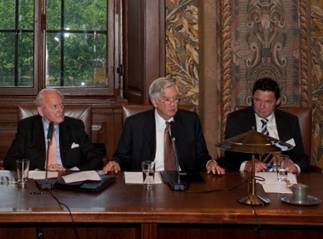 |
Roman Herzog, former chancellor of Germany, lectured on critical sounds
on the development of the EU >> |
Concerns were expressed about declining support amoung the citizens for common policies of the 28 member-states. More European integration does not necessarily mean 'lose of identity'. It is a misunderstanding to think that European countries can solve their problems within national context. Member-states of the Union should not hold their national sovereignty on all fields.
Strong institutions are necessary, now and in the future. 'In many ways we need no less, but more Europe'.
|
The key challenge for Europeans in the next few years will be to identify and collectively defend common interests and values in a rapidly changing world where size still matters a great deal. If this is indeed the end of an era, we are not yet sure what will succeed it. We are still fumbling in the dark, trying to cope with the damage created by the bursting of a big bubble. The political vacuum created by the collapse of neo-liberal ideology has not been filled as yet; if anything, it tends to be filled by populism. And this has major implications for national as well as European politics and policy-making. It would be dangerously naïve to think that the European dimension of the crisis can be dealt with independently from the rest.
Economic dynamism needs to be combined with a more qualitative and socially inclusive approach to economic development, thus creating the conditions for a new social contract that would cater more for the interests of the economically weaker, as well as the interests of younger generations.
|
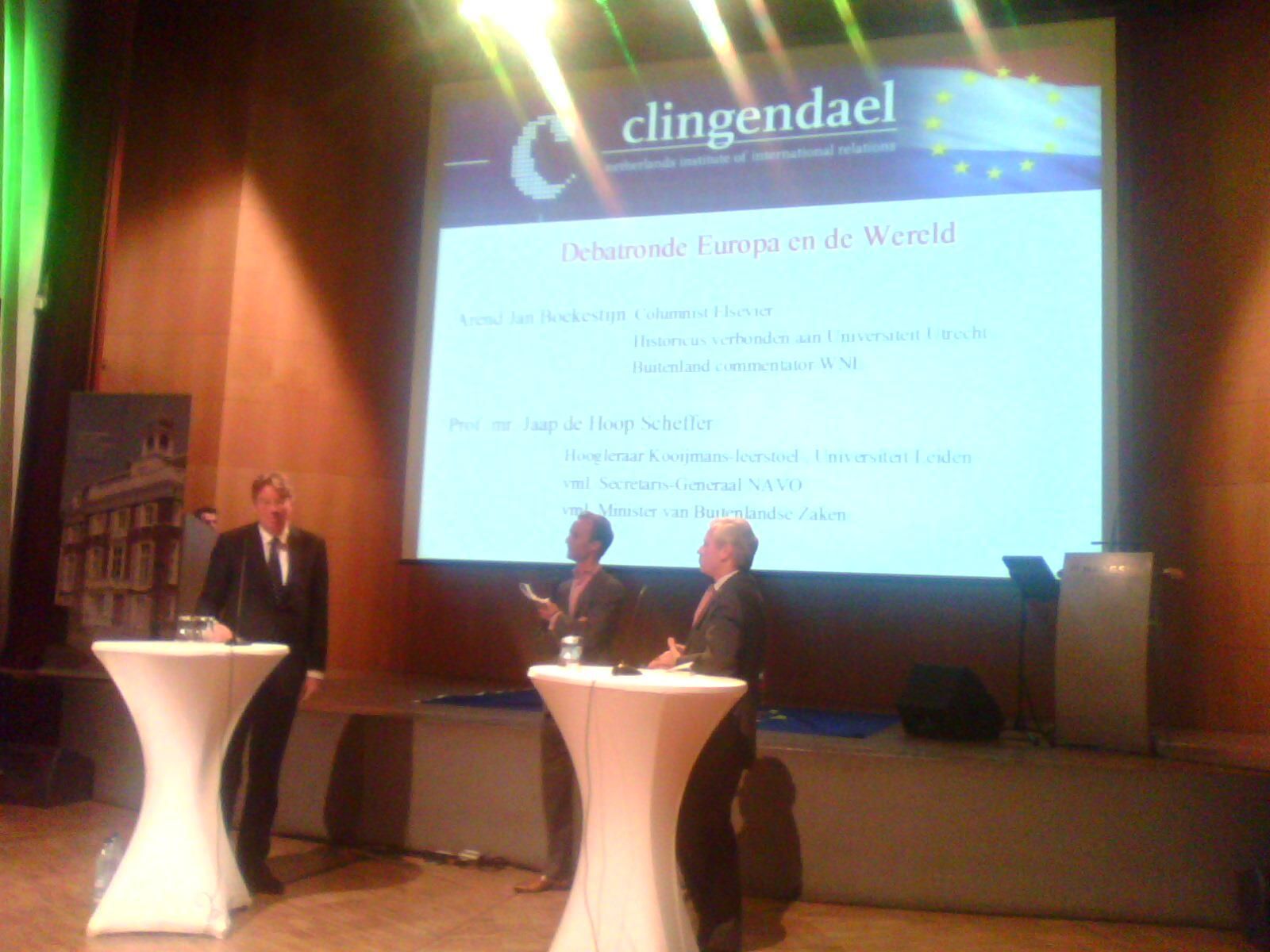 |
Europe and the World, a debate on mutual allocation of values between the European Union and member states |
The need that European countries need each other and that such starting point moves towards a Federal Europe, is set out in a paper, called ' One Europe'. |
|
